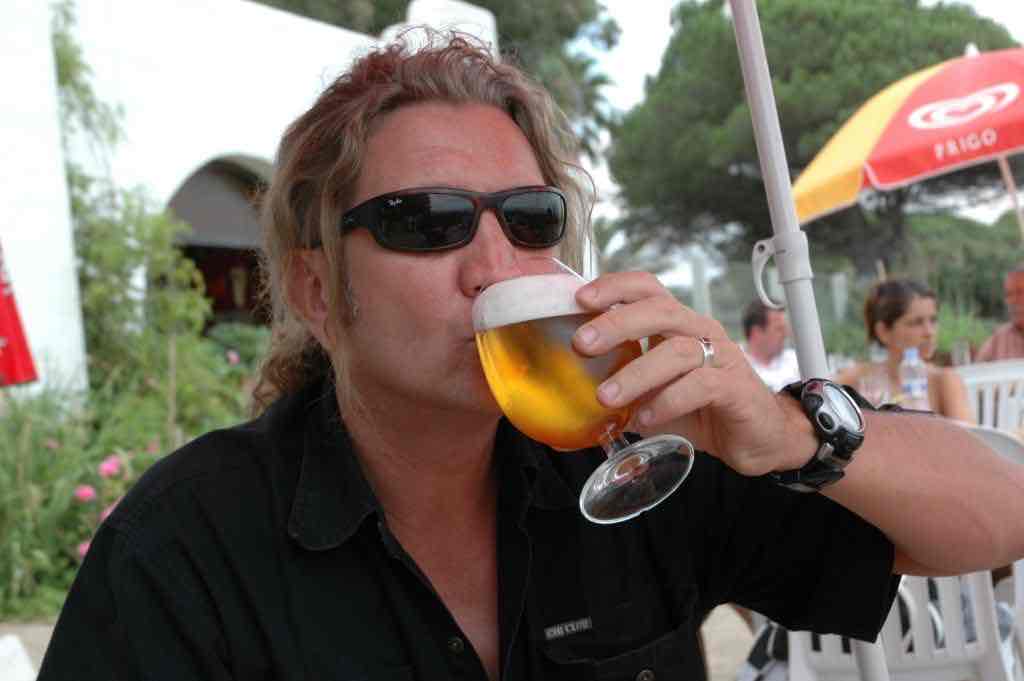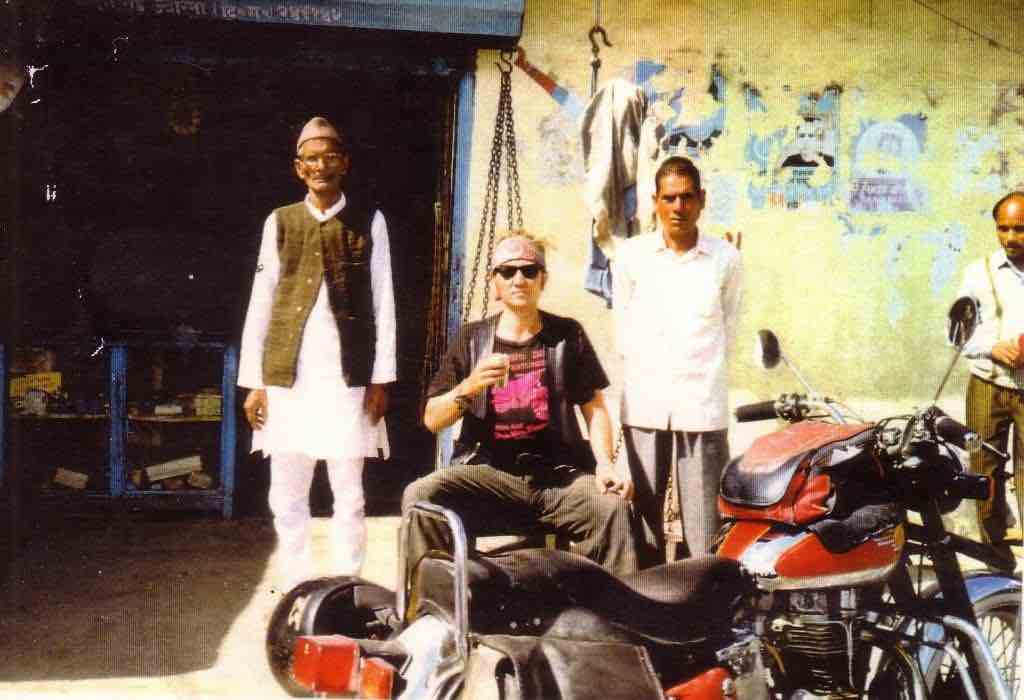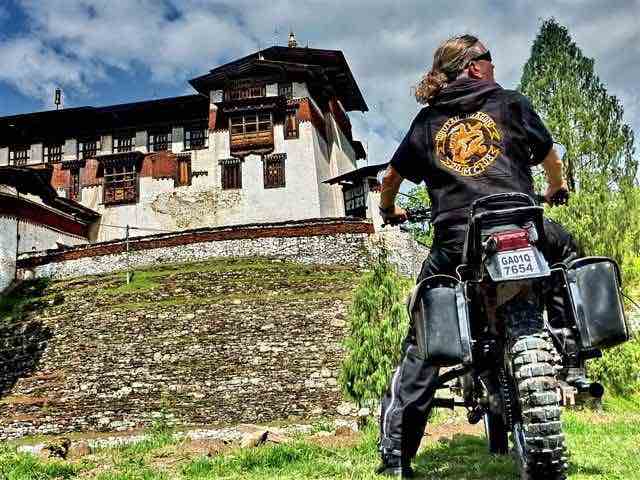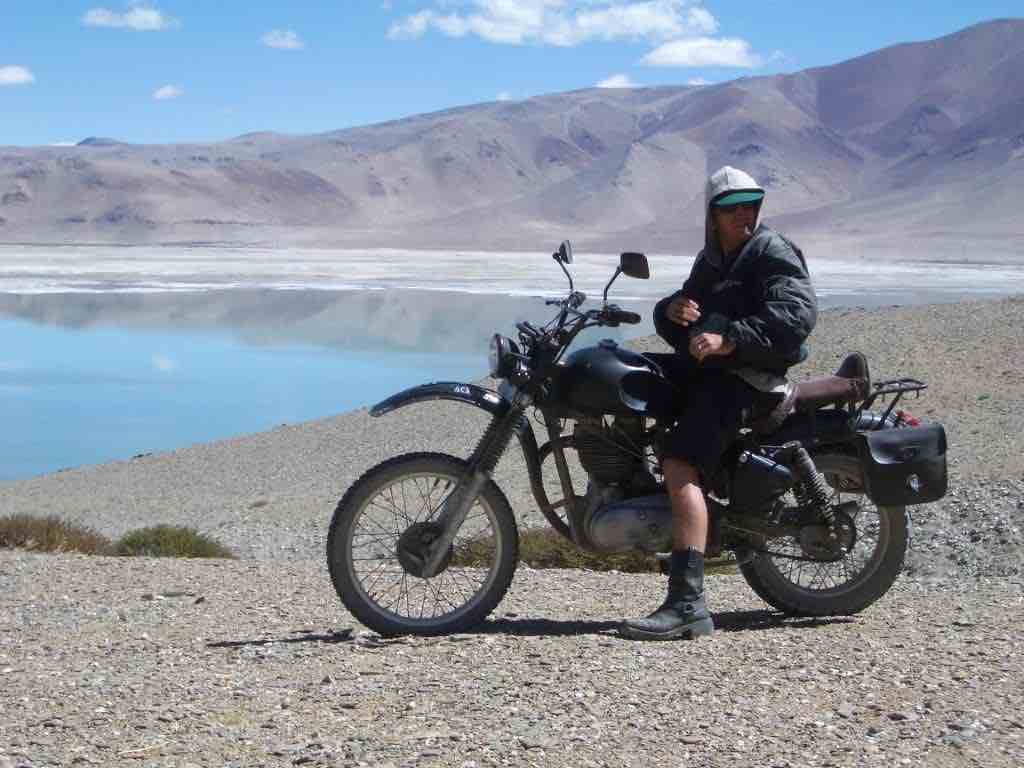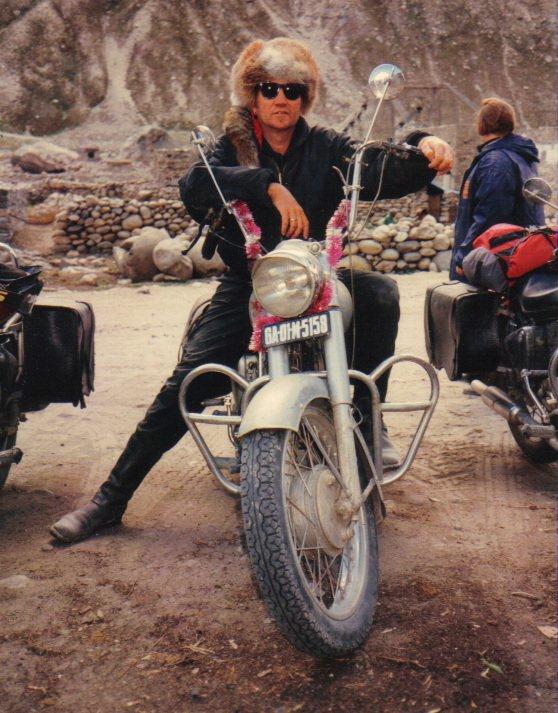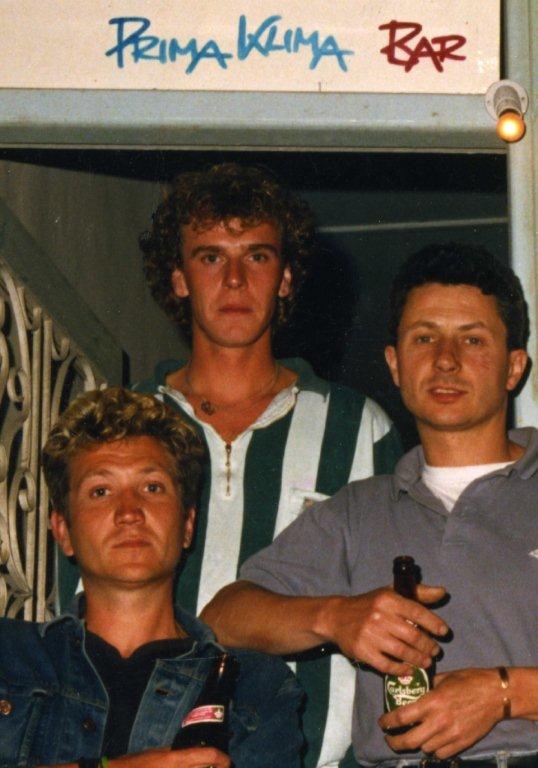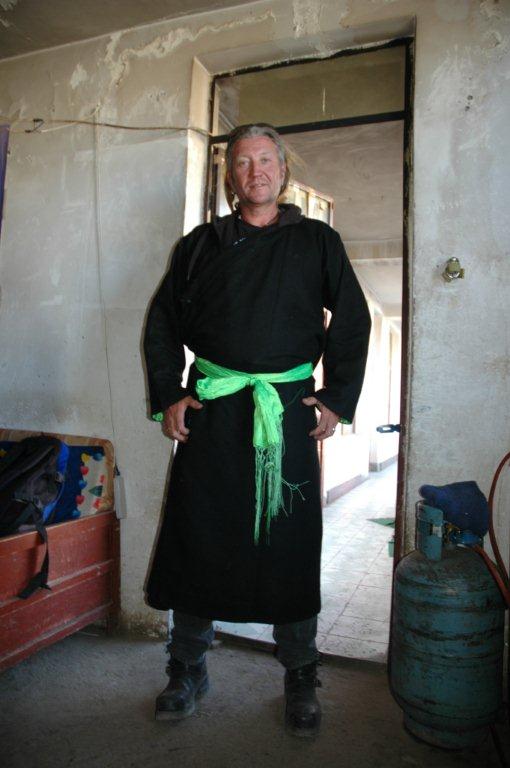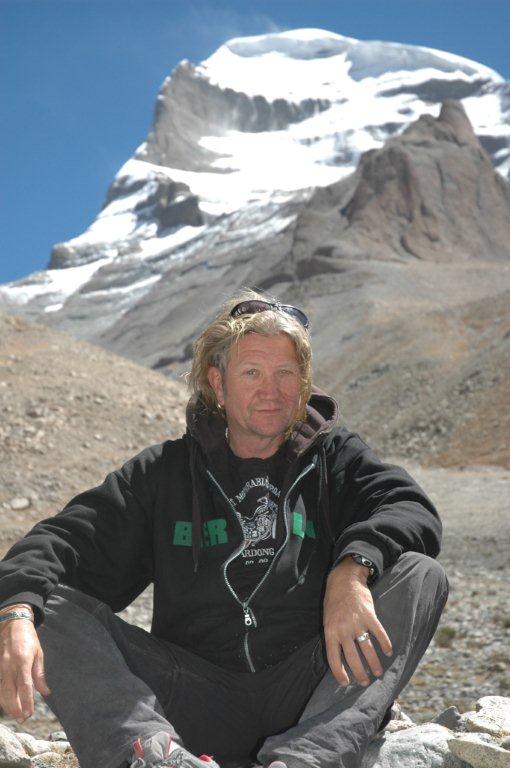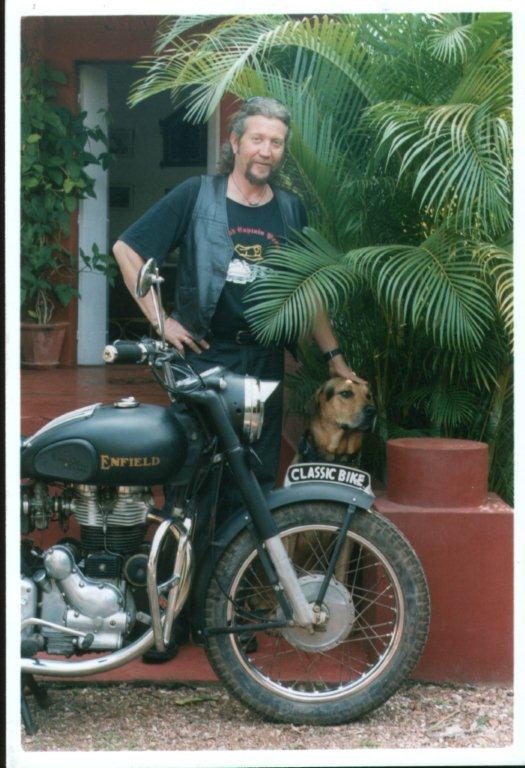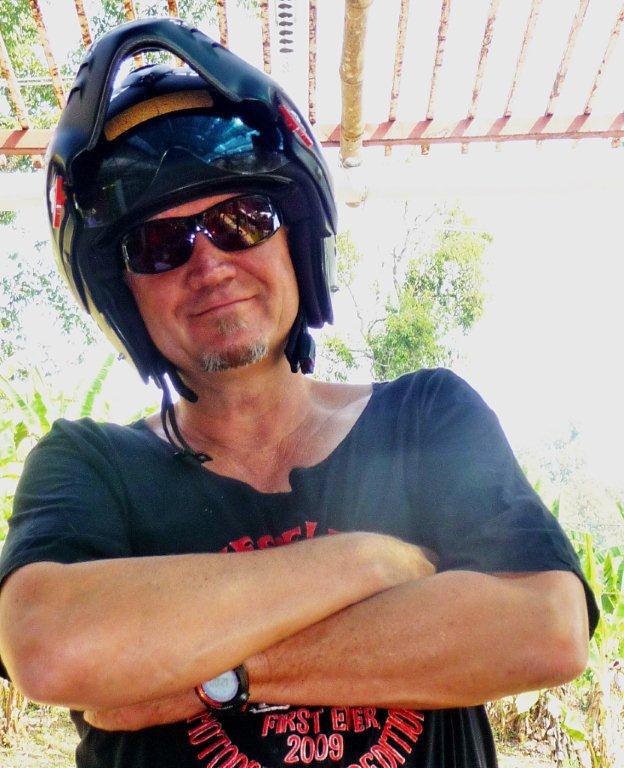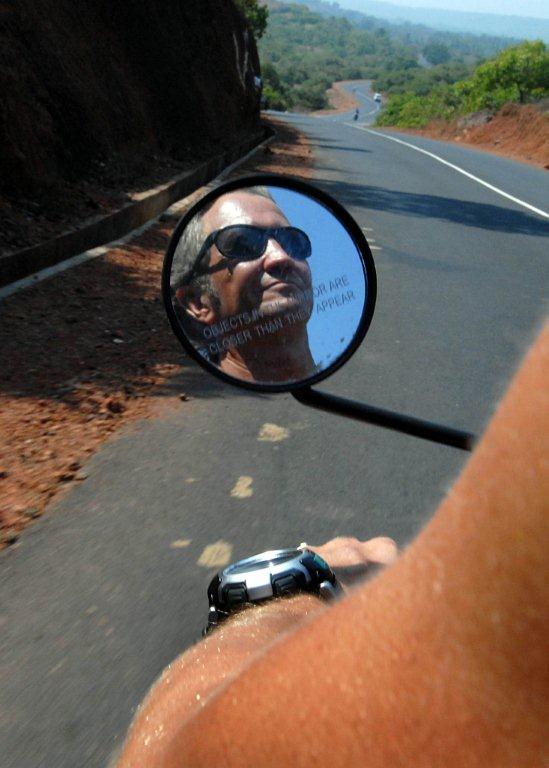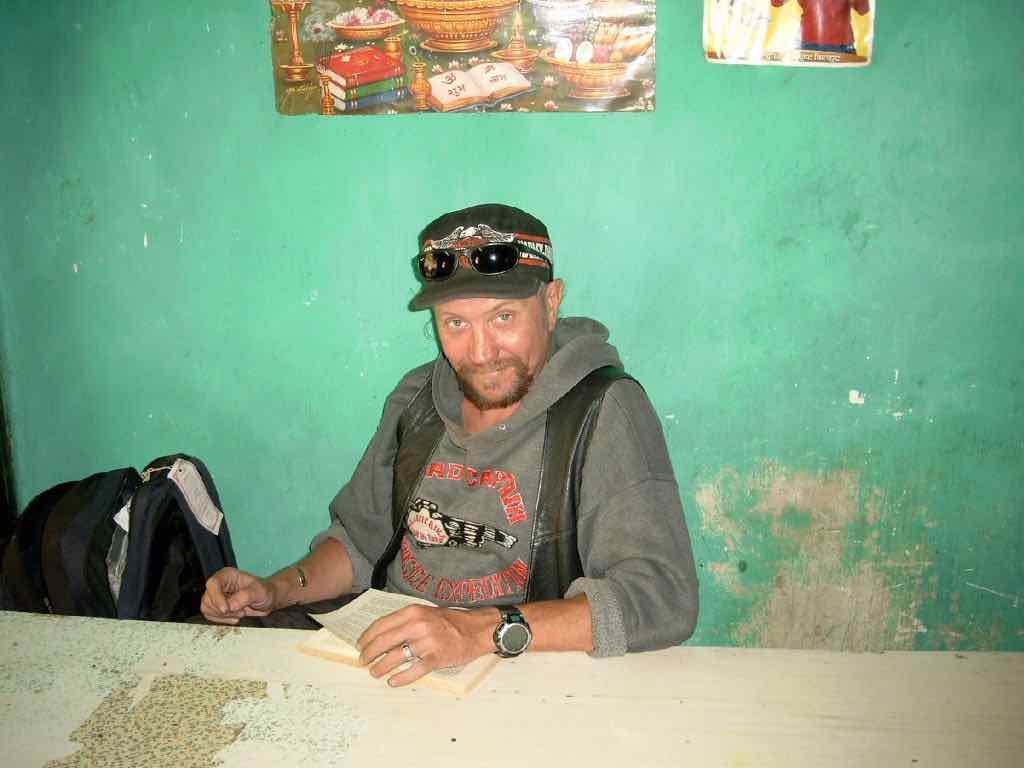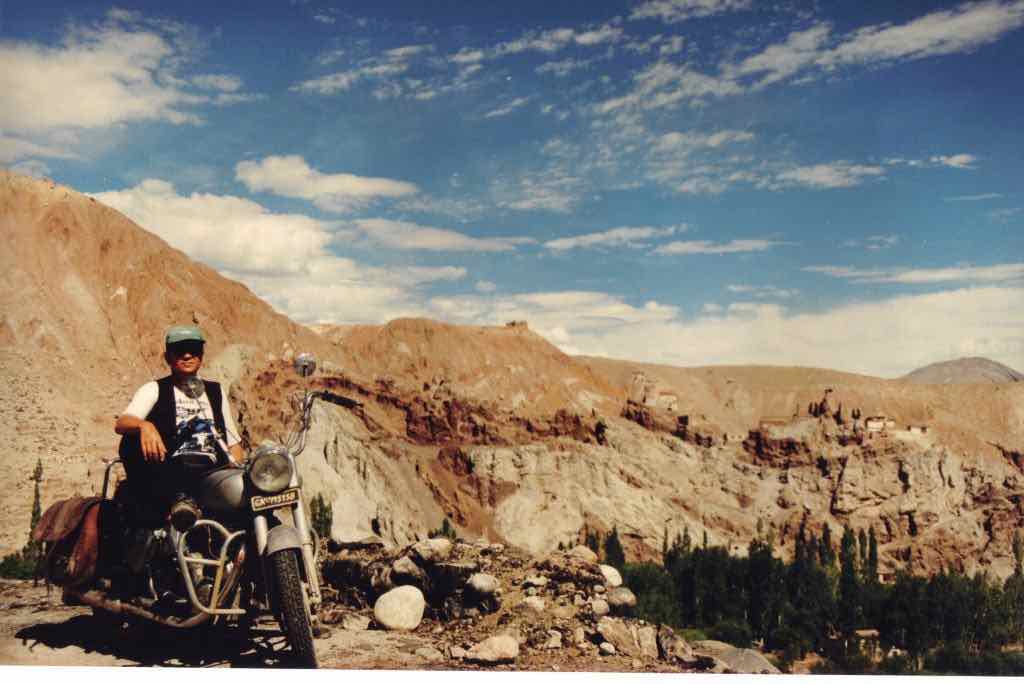CLASSIC BIKE PETER – In the beginning there was the Royal Enfield Bullet…
Interview with RC Peter Paulo dos Santos | Part 1
Interview with the German journalist and book author Harald Hetzel, recorded in January 2006 at the “Here & Now” beach lounge on Asvem Beach, Goa.
How did you end up in India?
My first contact with India happened 1986, through a bus driver colleague of mine. From West-Berlin we took off for Lisbon, a 48 hour trip, where we had a lot of time to talk. He had been going overland to India for every winter , his destination always being Goa. He told me a whole lot about Goa, especially about the old classic motorbikes, called Enfield Bullets. I was completely fascinated, me being a biker and all. I could not possibly envisage a life without them.
I happened to follow my friend, Klaus in 1988 to Goa. That time I flew together with a group of people down there to do a motor bike expedition. For three weeks we wanted to explore South-India. Klaus, through his connections, had already booked some bikes in advance. This was a complete adventure for us, because nothing happened as planned, actually. When we arrived we found some old junk bikes, all in terrible condition. Finally we took off with five bikes. I’ll never forget, that shortly after crossing Goa’s border to the South we were already pulling one bike behind us on a rope. We were actually getting from one repair shop to the next. We had no real maps and no guide. We were all good friends on this tour, one of them a famous musician with the band “Ärzte”, his alias is “Farin Urlaub” (Go on vacation).…
How did you get the idea to organize motorcycle tours?
I have been on the road a lot before. I did tours with bands, sometimes as tour manager and sometimes as bus driver. When I was not on tour, I was relaxing on Cyprus where I had leased a small guesthouse, off the main track, in the so called Wild West. I managed to put up a motorbike and mountain bike rental place, more of a non-profit thing, really. I could live well in Cyprus, but apart from that, there was no real money coming in.
How did you manage to get from Cyprus to Goa?
Well, the winter in Cyprus lasts for three months at least and it is very wet. It’s good for the island of course, but from a business standpoint, it was a disaster for us. On the other hand winter in Berlin is even worse.
So the idea came up to move to a place where it is really warm and Goa, as I than had discovered for myself is always warm. Totally hedonistic reasons, I admit, I just wanted to have fun, have a good time and ride a bike there, and that in a T-shirt and not wearing a helmet.
Also, on our first tour, we had some journalists with us, to promote the idea. I was able to place a long article, 10 pages, in Germany’s biggest motorcycle magazine. This generated so much interest, that the magazine asked us to organize such a tour for their readers. I jumped for it and together with a couple of friends, we bought some motorbikes and so, in the first three months we did offer several tours. We actually pulled it off to organize five groups, which immediately paid for the bike costs.
And that was as easy as you said in Goa?
As a matter of fact, nobody in Goa gave it any chance, nobody thought that something like that could be possible.
We had no company, you see, it was all done under the table, using front men and such. But I soon found out that the Indian mentality suited me just fine. As if I had been born and raised here. I felt at home much faster then anywhere else in Europe, adjusting easily to the “Bakshish” and the improvisational mentality around here. Indians have the gift to deal with all the chaos surrounding them and in the end coming up with a solution that suits everyone just fine. In Europe everything is goal-oriented, hardly ever sidestepping from the chosen path.
This is what I’ve got to do to achieve this or that result. In the beginning all processes in India seem chaotic and everyone seems to act on a whim, but surprisingly it they get to a result somehow.
Life in a permanent chaos is also a life in permanent communication with each other. You see, in India you can do almost anything if you have money.
How did you get along with the other ex-pats and/or the Hippies in Goa?
I got right into a scene here in India that had developed since the 70ies. Some sort of big brotherhood of likeminded people, who where leading a Hippie lifestyle, but in fact were dealers or some sort of businessmen.
They all had businesses going of all sorts and with different success. The ones dealing in drugs being the most successful of them. They were living in grand mansion houses, partying all the time and had the most affluent lifestyle. But all under the rules of Hippie-dom, so to speak, with boundless freedom, communal living, “easy living” all the way. If you were part of this scene, you soon realized, that everything was always about making some deal or the other. I come from the world of Rock business, you know, and I once had a music club in Berlin where there was drug dealing all the time. Me, I was only ever on the “user side”.
All of a sudden, here in Goa, I ran into the big-wigs wholesalers. They were discussing harvest times in Kerala and in Himachal Pradesh, talking about quality and transport and so on. So my first impression of the foreigners coming to India was, they are all dealers.
It was only after I travelled around in India that I met some of the more spiritually inclined, the seekers, if you want., which you don’t really find in Goa. I also thought that all white foreigners were called Hippies by the locals, but who are in fact all drug dealers.
Until recently, everybody I met in Goa had been listening to me talking about my kind of business, only to ask, with a twinkling in their eye, how the “real” deals were turning out? It’s hard to understand for some people, that you can be successful here in Goa in any other sort of business. Of course there are many drug dealers around here. They get organized attending the local flea market in Anjuna, but I never wanted to do that sort of thing, I never wanted to deal in drugs and I never have. I think there is bad energy behind those deals.
So, I kept my distance from that kind of scene. I lived my life in a separate corner. In the last couple of years there has been a change though. People have been coming to India to settle here. They are looking for a different sort of quality in life and it’s not about drugs, mostly people from the Bhagwan/Osho community, the ex-Sannyassins. They are more interested in so called body-work, healing or massage therapy. They did their studies in Poona, tried it in Australia or Europe, but they realized that they belong here in India, where in the last couple of years thy bought houses and settled in Goa. And I find there is more of “Life” in that sort of community then there is in the Ibiza-drug connection scene.
This recreational tourism between Poona and Goa has in fact been going on for a long time. But they were mostly short stays in Candolim, where are some guest houses along the beach. Meanwhile there is a real network, that is spread all over Goa.
Then of course there are people not coming from the Osho scene, who also started to settle down. For example, some animal lovers , who built up an animal rescue centre or Anita, who set up an orphanage. Anita is a sixty something English lady, who once had a terrible accident during a vacation in Goa. She had some “borderline” experiences while recovering in hospital. She decided to turn her life around, working for social projects. She started with the “garbage kids” in Mapusa. She went to the flea market and started collecting money from the foreigners. That enabled here to lease her first shelter home. Anita has been doing very well and now she runs five such shelters for the kids in need, all of which had been giving to her for free. Now she has several busses, two schools and she founded day-care centres in the slums, where she serves food to the destitute.
There are social problem areas in Goa that as a normal tourist you would not recognize. Between Vasco and Mapusa there are some of the biggest industry complexes, with the respective slums. The British and Dutch, who founded the animal rescue centre have set their eyes mainly on the street dogs. They could not bear the thought that as the season ends, all dogs get put into sacks at simply beaten to death. The locals are afraid that, during Monsoon season, these dogs will form bands, attack old people and children searching for something to eat, which happens a lot. Now one can leave a stray dog at the animal shelter. The dogs are being taken care of if they are sick, get their shots and get sterilized and if you want a dog you get one from there. Then there is this natural birth centre with water birthing, run by a German. This all happens in a small village called Assagao, where I also have my guesthouse, restaurant and offices.
How did you mange to set up you business so successfully?
After our initial success some people immediately tried to copy us. That did stir up quite a commotion in the beginning. I soon realized, that if you want to run smoothly, you have to organize it on a totally legit sort of way. If any accidents occur, you are confronted with the police, and then you’re in trouble. You can set up a hit-and-run business here of course, but not if you want to live here. Until 1994 you could not, as a foreigner, set up a business, could not invest money or own something under your own name.
One day I got a visit from a guy from Auroville, a guy called Thomas Warneke, who happened to start a similar business, with the same idea behind it, at the same time. He soon realized, that with our article in the motorbike magazine, we had a true advantage already. He offered to cooperate with us, which we accepted. Thomas had a lot of qualities that I had not, namely , he had already been living here for 12 years. He had criss-crossed all over India on his Bullet. Through him I gained a lot of expertise and experience, which otherwise would have taken me years to come by. He knew all the Hill Stations in the South and knew all the routes. He also had the advantage of living in the commune in Auroville. He came up with a business proposition, where our company could be registered as part of the Auroville trust. Thus we could pretend to organize motorbike tours for Auroville residents and there guests. We were part of the trust, a non-profit organization, everything belonging to them. We got our revenues from them and we could put against it our expenses and everything was legit. We could write proper invoices and could rent motorbikes. That gave us a big push forward and worked for about three years.
Then, in 1995, Thomas decided to return to Europe. That year was also very crucial for me, because I had learned an important lesson. I had befriended a lot of people, by now, amongst them a certain Dietmar, who was an important figure in the scene around here. He owned several guesthouses. Together we transformed a restaurant into a biker bar We called it the “Enfield-Mahal”. It was supposed to become the first true biker meeting point, live music on stage, a coffee shop, an Enfield work shop and aleather boutique. And we did all that. But during our first year of business, Dietmar lost his life in a motorbike accident. After his death there was a heavy dispute about his inheritance. He had two Indian women under whose names the company had been registered, because he was a foreigner.
On the other hand, that year the first economic de-regulation and liberating laws had been passed. But this did nothing to stop these women of going to war. In the end, my part of the business had gone up in smoke. I was left with nothing, since I could not show prove of all my investments. Three motorbikes was all I could salvage from the wreckage. We had put up the money for the entire restaurant fittings, the PA, fridges and so on…, everything gone. That’s when I went back to Germany and it took me that summer to get myself back together again. The result was: I wanted to get back to Goa and give it another shot.
Meanwhile I knew one could establish a company under one’s name. In Bombay I knew some secretary executive and at the same time I had contacted the German Chamber of Commerce. I even had a business plan, or what I thought looked like a business plan, anyway, and I asked them if I could become a member. Amongst such companies as Siemens, Daimler and Dresdner Bank. At first they were slightly bemused, but they took me on board. I then called a friend who was taking care of my bar on Cyprus and also another friend and I asked them both to become my business partners. As it happened, after two long nightly calls, next morning I knew I we had a company and it should be called: “Peter and Friends Classic Adventures Private Limited”. The idea was to put everything around motorbike tours, like a workshop, adventure tours into a veritable business, including guesthouses and jungle lodges.
First we had to go through a massive amount of red tape. This was done by a friend. I again put up the capital and had to wait for half a year until I got the approval of the central government. With this I could register the company. I had to open a bank account to be able to transfer the money from abroad. That may sound easy, but let me tell you, every one of those steps is a time consuming affair in India. In addition to that, since the laws were brand new and no foreigner in Goa had ever before owned a business under his name. There had been joint ventures, yes. I was running around like madman in Goa at that time. All offices simply declared that there was no such new law. Finally the central government in Delhi realized that their new laws and administration directives did not trickle down to the other states within the union.
My case was finally settled in Delhi within a month time under the clause that their would be no objection filed against me. So, for our endeavour we got the permission and we went back to Goa. But there still were obstacles thrown in our way and I went to the German Honorary Consul in Panjim, Mr David Menezes. He was the second son of one of the biggest head of an industrial group called Menezes Group of Company. They are into all sorts of imports especially in the chemical sector, for example they are heading all the Beiersdorf product lines in India with products like Nivea or Tesafilm. So there is a strong connection to Germany there.
When Germany was looking for someone for a consulate post they happened upon the second son. He is no businessman at all, more sort of a bohemian, who loves the arts. His other brother is one of the big business tycoons. But he was supporting German cultural exchange and German business interests and somehow David Menezes liked my business idea and made it his personal agenda. All of a sudden I had a tax consultant and a lawyer from the Menezes group at my side and could use their contacts and, lo and behold within two weeks my business was set up. All major problems had been taken care of. You first have to get inside the red tape circle and it can take ages, and you are expected to pay bakhsish to speed things up. Later on I met the woman of my life, at least that is what I thought at that time. I married her and took on her family name which was Paulo dos Santos, her being from Brazil. Now I called myself Peter Paulo dos Santos, and in Goa that name is not unusual at all, since many families still have Portuguese names here. Now we wanted to built our nest, our new home. I had already rented three houses in the past and it’s always the same story. You find a nice spot with a nice house. You renovate it make it look nice, do some gardening and everything looks fine. Then the landlord comes around and says: “Wow, that’s a good looking house now, I increase the rent threefold, or he decides he now wants to move into it himself. We found a place in Candolim and by that time hotels were coming up like mushrooms everywhere. The beaches were crammed with shacks with big and smaller restaurants. The climate began to change between the locals and the long-term foreigners, all over money of course.
I had been watching this for a while and decided, I wanted to live like a local, so I moved to a village away from the beach, with no tourist developments. For that one only had to move a couple of miles inland and it was in Assagao, where I found a perfect space.
It took over one year before I had all nine signatures agreeing to the sale from the bequeathed nine siblings. They were spread over three continents. I had two lawyers working for me and I got help from the mayor of the village as well.
You have to be on your toes in these matters. If for example you have a contract with two brothers, a third one can pop up claiming his rights. With every piece of real estate you can count on a minimum of ten to twenty heirs. I got lucky, I only had to deal with nine. All the family connections were clean cut and all had agreed. Part of the agreed selling price was to be paid “black”, as this is the custom here. This sum had to be given to the bank of the Vatican in Rome, since one of is a priest there.
Finally the company bought the piece of real estate, which would not have been possible a couple of years back. I assimilated to the village lifestyle very fast. The biggest mistake that most foreigners make is, that they don’t actually respect the locals. They frequently underestimate them or ignore them because they think they are not competent. I saw a lot of Westerners fail because of that. There are these certain people who think, just because they’re from Europe it makes them superior. By now, I have a pretty good eye for those who will make it here and for those who won’t.
What happened to your marriage?
Well, we sort of drifted apart. She loved Brazil, her home country and she went back. We had planned to stay for five years in Goa, build up the business and go back to Brazil together. We had a plan, mind you. Even then, my true love was for the Himalayas. I always got a lot of power and energy in the mountains, much more then close to the sea. If had to decide today, I would always pick the mountains. I also would know exactly where to.
Well, and where would that be?
I’m not gonna tell you. (Peter laughs). In the Kullu valley, off the beaten track. There are some beautiful spots up there, I love it there. My partner had, in the meantime, taken over a travel agency in Germany, that he also wanted to keep for five years and after that he planned to spend his early retirement in Goa. I had planned to built up the business here in Goa and then spend half the year over here and the other half in Brazil. Then, just two years after Dietmar, he, died as well in a traffic accident. My wife and I had just bought the lot and we were busy renovating.
He came over to look at the property and look at the state of renovation. One evening he was overtaking a truck, a bit too sportily, you might say, and he hit his head against the side view mirror of an oncoming bus. It snapped his neck and he died instantly.
Thereby I had lost my two main partners. My second partner had already left before with mutual understanding. So there I was alone again. What to do? Stuff it all and loose everything? Or find new friends and carry on. I decided to do the latter and decided to get new friends on board and carry on. That went rather well for a couple of years – then the black pest hit India, earthquakes, the war-like situation with Pakistan in Kashmir almost leading to a nuclear conflict. On the tourist side, India was dead as a doornail. We just managed to get enough tours together to survive. I often asked myself how long can we keep this up, and how I am going to pay my staff. When comes the point where I have to pack it all in? I even wanted to sell the whole thing. But then, nobody wanted to invest any money in it. Now, of course it’s different. I stayed on, my wife didn’t. She said, she couldn’t stand it any longer. .
What did she mean by that?
She was a strong emancipated woman, very body conscious and sexy. She was a dancer. She couldn’t come to terms with the super sexually inhibited macho society.
The Indians are the most sexually repressed and deprived people I know. Brazilians are quite the opposite, with them bodily expression is everything. My wife constantly hit against a brick wall over here. The communication and above all the mentality.
She had come over here as a student, wanting to learn classic Indian dance, study Sanskrit and play the tabla. She did all that in her year long studies. After that she had fulfilled her cultural mission. Before that, she had studied belly-dancing in Egypt and in Italy expressive dance. These skills she intended to take back with her to Brazil and work there. Our love and marriage had put this back for a couple of years but it had not actually changed anything about her will and commitment. The funny thing is, that in our five years of marriage I never made it to Brazil. In fact, Brazil had been my dream destination all along. And now I’m sitting here in Goa – India.
That sounds as if your separation came about with an air of mutual understanding?
The separation from my wife was difficult, very emotional. But in the end it was the best decision, for both of us. Without her I would not have built up the House in Assagao. She did help me a lot. She was living with me on a construction site for two years and when we were just getting on top of things, our relationship went into two different directions.
Ever since I lead my company as one big family, where everybody knows his or her place and I have different partners. Now India has become more and more fashionable, with things like Ayurveda, the colourful fabrics, Indian cuisine, the Bollywood movies and the music, this helped us a lot. Before all everybody knew about India, was the filth and dirt, poverty and some sort of spirituality that nobody really understood.
So there was an India boom all of a sudden?
Well, the amount of tourists coming here is still small. If you think that over 20 million tourists go to Mallorca every year. In Goa there are 300.000 guests (plus 700.000 Indians), 50.000 of them being package tourists, that number is very small, compared to Mallorca, they have that in one week. I have seen different waves of tourism here. The times of truck and bus corrals and the times of Israeli squatter houses (houses full of Israelis, where nobody dared to get in) are over. There was a time when on Vagator beach there were only Israelis, nobody really wanted them there either.
They lost their dominance to the Russians. Meanwhile, the onslaught of Russians proved , that they are even more dominant then the Israelis ever were. But the Russians are more sustainable. They are less aggressive out front but they are more to the point.
If they want something, they are not yelling at people, they just bulldoze their way in. If they want to take over guesthouses, they’ll get them. They do it like they do at home. Those who don’t leave, run the risk of getting into an accident. They are also ingrained on a political level and some come over here with a clear intention of staying. The Israelis come over here just to have a wild time. The only thing they’re interested in is small time drug dealing, so as to make a quick buck to finance their stay. The Russians on the other hand they come over with money and have a clear intention to take over businesses to launder their black money. First thing every Russian wants, is to leave his country. They are unsure about their future, politically, back home.
At Morjim (North Goa) every second new house has been built with Russian money.
And how did that go down with “old-timers”?
There is this story about this Belgian couple, who first owned a restaurant called Olive Ridley. Together with the World Wildlife Fund they had put up Turtle protection site. About seven years ago, they owned a very beautiful house behind the beach, where the restaurant was, a very idyllic place. So everything went quite well. One day some Russian pimps came in and “parked” their girls there. During daytime they were sent to the beach, and at night they were shipped with Ambassadors and limousines to the five star hotels to turn tricks.
The Russians had sussed it right away, that this spot was an ideal remote sort of place. So they bought some land in the neighbourhood and they also wanted that particular idyllic place from the Belgians.
At first they offered them a big sum of money. They refused, them not being really poor themselves. They did not need the money, they simply wanted to live there. Then the Mafia methods came into play. Threatening and menacing them.
But the Belgians had good contacts to the press and the local politicians. The whole affair hit the papers. Finally the minister came down reassuring the couple that nothing would happen to them.
The Russians changed their strategy after they had found out that the relationship between the couple was at a crisis. They put one of their hottest broads onto the guy. He totally sucked up to the Russian girl who was 30 years younger than himself, and he fell for the ploy. The wife left him.
The Belgian was partying it up with the Russian girl and started to drink heavily. Slowly the Russians became the upper hand. Naturally, the Belgian, as well as all the other foreigners, had no building permission for his house.
In the end the Russians achieved to implement the “demolition act” with the help of the local magistrate. It roughly means, that within a 500 meter zone away from the beach, no construction should be allowed. So the beautiful house got torn down. Today there are two brand new three-storied houses right next to the lot, owned by Russians.
The place were the Belgians had their house is still vacant, lying there, like a monument. There is a sign that the Belgian put up himself, saying: “Don’t fuck with them!”
So the Belgian left?
No, he re-built his little beach shack and tries to just make enough money to get by. Right next to the biggest Russian Mafia restaurant you can imagine. You have to just go and look inside that place, you see all these heavy duty muscle types and the broads.
This has become the biggest Russian meting point. The young Russian girl split, just as is wife before.
Now the Belgian is running around on his scooter, solo. His ex-wife, who also had the money, is now living on bird island Corao. She bought a beautiful house there and has some rooms made up to rent out for nature lovers who come and visit. It is supposed to be very beautiful. I personally thought it a shame, that their marriage broke up. She was the heart and soul of that place. He had been a racing car driver in the past. That is only one of the many stories I could tell you about life in Goa.
So this is the “Russian way”?
In South-Goa the Russians are very dominant. Palolem is full of them. Meanwhile there are a lot of scene-Russians by now as well. young Russians, who are into drugs, doing Yoga, even spiritual inclined Russians, with very little money. There are many Russians, who don’t speak a word of English, but they get by through a network of Russian doctors, bars, visa agents, all within the coastal belt. They have their own parties, also.
On the Saturday Night market and the Wednesday market they are hardly to be seen. There you find more of the Israelis selling stuff. Once I’ve been to Chapora, in a Russian bar, you get a funny feeling being non-Russian, I can tell you. So after all the Hebrew lettering , now all of a sudden it’s all Cyrillic. Anyway, the Russians are more popular then the Israelis ever were. You only ever deal with an Israeli, if you absolutely must.
Why is that?
I can only make an assumption here, but the people of Israel are always under such a existential pressure, so they’re on a constant adrenalin rush. They always seem to be switched on to “aggressive mode”, even when it’s not necessary at all. Apart from that they are arrogant. They hardly have any respect for Goans or Indians. They think themselves as the chosen people. And they try to show that attitude towards the Europeans, the Americans and the Australians. That’s just the way it is.
Of course that’s a generalization, and there are exceptions to that also. There are some wonderful mellow Israelis, but very few. When it comes to dealing and wheeling, they have an attitude suggesting, they are not even prepared to pay anything. Then they start haggling in such an such a way, that is down right insulting. On top of that they got this pack mentality. You have three Israelis renting a room, one hour later, there’s ten or twenty of them occupying that room. That’s the kind of shit, they are pulling here.
Many Israelis come here right after having served in the military, they are still de-emotionalized and full of aggression. That’s what military training is all about, to be raw and aggressive. So you can you imagine what kind of mindset they’re in, when they get here.. But as I said before, the Israeli invasion is history, maybe it shifted south, I’ve heard there are lots of them in Gokarna, also in Hampi.
Can you tell me about your most profound experience her in India?
Well, I got into a life threatening conflict once, through my own stupidity and crazy coincidences, where I came into contact with a bunch of very dangerous Indians.
Without even realizing it, I was killed almost twice. It was a great feeling when the villagers from Assagao all stood up for me and supported me without asking anything in return. They did it because they liked what I’ve been doing. That was a very moving experience. I was really touched by that, sort of like a epiphany, I knew I wanted to be at home here.
What happened actually?
I got into a brawl with a couple of local guys. It turned out, those guys were working for the Mafia bosses. This escalated into a situation, where the actually wanted to see me dead, and they almost succeeded.
How?
They hit me over the head with a heavy iron bar. I could just barely make it and got away. With their iron bars they smashed all the car windows and then they tried to stab me with a knife. I jumped out of the car, hands over my head, breaking all my fingers, because they were still hitting me on the head. I ran into the water and swam away.
All of that happened in Siolim, at the ferry station. I swam until I reached a fishing hut were I could get out. The fisherman gave me a place to hide. That was impressive, he just said, come in here, and you will be safe. The gangsters were still looking for me. The police only arrived two or three hours later. That was an assault , a matter of life and death.
It was a huge headline story in all the Goan newspapers. Even the chief minister himself put his own security guard in front of my house. It was a good thing too, after I found out with whom I had been dealing with……
And how did you get out of this situation?
One thing was quite obvious to me, you have to solve this problem, otherwise I could not continue to live here. I could not rely on politics in this case. It was the Mafia.
A compromise would have to be made, somehow. That’s exactly where the people in the village came forward. If that would have failed, I could have packed it in. Neither my life nor my business was worth anything anymore. Nobody would have dared to work for me ever again.
Why did you get into the fight with the locals in the first place?
It happened one afternoon, while waiting for the ferry, a drunken hooligan touched my wife’s breasts. I hit him, and hard at that. The guy looked like a Bombay tourist, an Indian. But it turned out to be a killer from the local Mafia. First we got hold of him, then he managed to get away only to return with some jeeps and a couple of other guys. They tried to knife me. I would not have smacked the guy if he had not touched my wife.
He had completely lost face amongst his circle of friends. Him being the muscle and a killer, his only answer to that was to kill me. Otherwise his cronies would had laughed at him and taken his job away from him. His street cred a s killer was, that nobody could touch him. And I had smacked him so hard that he was lying on the ground in front of all his buddies…
That really was the most hairy and dangerous situation of all here in Goa. Resulting in a beautiful solidarity amongst the villagers. They said to me, that after the ministers bodyguards would have been pulled off after a week, and if by then they would not have negotiated a compromise, they (the Mafia) would go and get me. And that’d be the end of that. A murder case like that would drag through the courts for as long as five years and by that time, nobody would be able to remember anything anyway. Even if they cannot get to you, they would be getting to your staff, scaring them off, so that nobody would come to work for you anymore. You can close up shop, period. I have been hospitalized after the attack for a week. When they released me everything had already been taken care of. I had to go to the police to make my statement. Part of the agreement was that I would not recognize anybody’s face, so the case would be dropped. We paid the court fees, they paid the repair of the car. Thus we had a life-long “peace treaty”.
Behind that gang was a minister. He is the boss of the whole area around Siolim. He was so corrupt that the Congress party removed him from office. He owned the biggest bus company and they are top dogs in the smuggling business with Bombay. They could hardly welcome any more bad press. We often made the headlines with pictures in the local press since we had such good contacts. They did not like that one bit.
But without that agreement I would not be sitting here today. No way! So after all it was a valuable experience. My lesson from this was, that if you embed into local village society, just as I had done , that society will support and carry you. I only gad been here for two years, you know.
The worst experiences were all the accidents that I had witnessed. Accidents where friends or partners are lying on the ground and you can’t do anything for them, since they suffered severe head wounds and you just know they’re gonna die.
Than there was this one incident in Nepal. One of the tour members had run over a child. It died shortly after at the hospital. I have been there at the time, with the family. That was quite horrible. I will never forget those pictures. I was holding the head of the four year old, blood coming from an open head wound running into a bucket. The girl did not want to die. We were about to get a helicopter to get her to Kathmandu, but somehow it was obvious that she would not make it, that she would die any minute.
Life and death are dealt with on a different level in India. For example that time when I got to the site of my partner’s accident , they already had removed his clothes, dressed him in a lunghi and had put him onto a police jeep. But it was one of these short police jeeps and his legs were hanging outside dangling in the air. He was dead, of course. They told his girlfriend to just follow them to the police station which was 20 km away. She could not handle that, she was totally beside herself. I just arrived as they took off and I stopped the convoy, yelling at the cops, that this was not on, then they started shouting back at me and somehow we found a way to deal with that. Here in India you learn when to play the authoritarian card, if you have to. If like me, you’re on the road a lot, you get to see the most horrific accidents. Body parts being left for ours… India is heavy in every which way.
In your current phase of life, what is most important to you?
Love, love – that’s what it’s all about. This I came to realize. Love to all the people, all the animals, to myself and to my environment. I have been going through a process for the last couple of years where I ask myself, what is my life, who am I, and what is important?
The basics I learned earlier on from the true masters. To realize that love has to start first and foremost with yourself. Only if I am willing to accept myself unconditionally, then I am capable to love somebody else. This includes of course that you realize that you are after all alone. Everybody is. You live alone for yourself and you die alone. To accept that, is not easy in the beginning and it might take a while. I am grateful to be able to live this kind of life, that I can enjoy life to its fullest and I really do feel like I am walking on the sunny side of life. I reckon, I made some right decisions in my life. With everything I do, I try to live with the principles of love.
What are the masters that you take your guidance from?
The written and spoken words by the Osho. I have never been there, never met him personally when he was still alive. But his words did impress me. I believe there are many quintessential truths in what he was saying. His clairvoyance is remarkable.
For sure there are other great masters, I just did not meet them or they have not made any impact on me. The Dalai Lama for once. His saying a lot of good things, but its just not my way. Whereas what the Osho says, I can accept.
Do you have any piece of advice to give to a young “wanderer in search of the truth”?
My credo is, to really live with love and show genuine respect. This is the foundation of life itself. And to be conscious in your decision making. We live a life that constantly surrounds us with making decisions. Most people aren’t aware of that, though. But there are certain prerequisites for a decision, always. Your head, your emotions, your instincts. Since we are all different, some of us go more by instinct others do not. First you got to find out in which category you’re falling, what are your dispositions. It is very important to know on what basis you make your decisions.
I have found that out for myself. And I am very glad I did. If, for example, one wants to travel to India one should have made up his mind beforehand: Why is it, that I want to go there? If reason doesn’t give you an answer, it doesn’t necessarily mean, that’s a bad thing, maybe my instinct is telling you – India is good for you, it just feels right. That’s how it was with me. Then there are others, that get a warm feeling, some emotional stirring from inside. Main thing is one has to be conscious about that, be clear about the why: “why India?” The answer to that question is already shaping the outcome of such a journey, that is my opinion, you know, if it is going to be a safe and sound trip. If you are absolutely clear about that, there is not a lot that can go wrong. Many people I meet are absolutely unclear about what they really want over here, they have no clue what they want from themselves either. Most often the main motif is escape. Escape from yourself. Escape from realizing the fact that, first of all you have to be happy about yourself. Love yourself and accept, that we all are lonely, and desolate. Every one for him/herself. Only then, when you accept that from deep within yourself, are you able to connect to other people.
If I had the chance I would like to live completely by myself for a while. I have not had that experience yet. I am stuck in a situation in my life, where I’m always surrounded by so many people. I do love to spend an evening all by myself ever once in a while. I always feel good after that. I really love that. I could not always do that. It has a lot to do with my upbringing. I was just as confused as everybody else. Always input, always consuming, you know. This one sidedness was being taken care of in India. For me, this happened in India at least. It could have happened someplace else, I suppose. But I also ran into the right sort of people. If I reminisce, I did have depressions at some time where I did not know how to go on. I was desperate and just wanted to kill myself. There was just no perspective for me at that time. This “being in limbo” just took away all my self assurance, I could not find any joy or pleasure in anything. It is hard for me to imagine for me now, to think back how I felt at that time. That was only five years ago. Then I met some people, who showed me the way out of this dead end street. The way led me to the realization, that it’s all about making decisions. What decision to make at what stage of life. I was not aware of the connection there. So, by and by I made decisions, I can’t control everything but I can control a whole lot. If I have a clear mind, that is.
Peter Paulo Dos Santos, aged 47 at the time of the interview in 2006, living in India since 1989.
If you want to read the second interview, click here.
Translation by Andreas Liese, Munich
andreas.j.liese@gmail.com
www.otbebookpublishing.com









